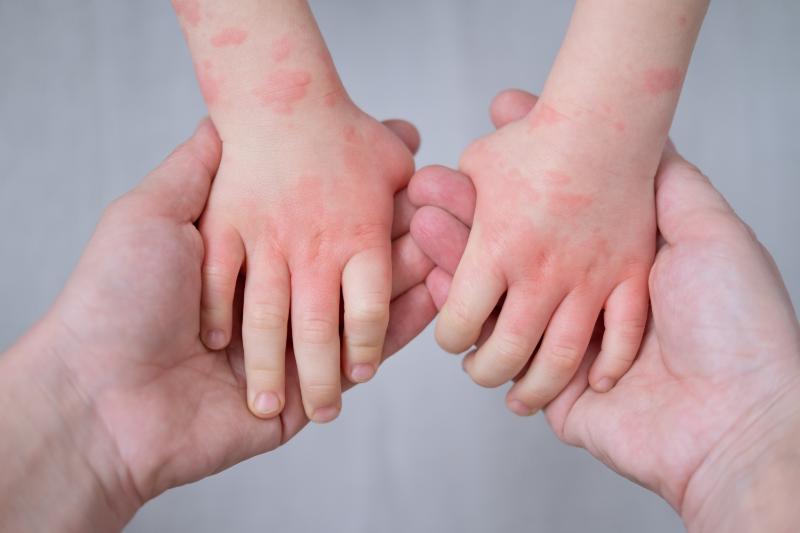Hand, foot, and mouth disease (HFMD) is a viral infection common in young children who attend daycare and school. It is characterized by a rash with blister-like sores along the hand, feet, and/or mouth.
Since a virus causes HFMD, there is no specific treatment for it. However, HFMD symptoms typically improve within a week after the virus incubates.
While complications are rare, it's important to note that HFMD is highly contagious, making prevention vital to prevent its transmission among children and other adults. Proper hygiene methods like washing hands and avoiding sharing personal items can significantly reduce the risk of infection with HFMD.
Hand, foot, and mouth disease typically manifests as a rash with blister-like lesions. The rash may appear differently depending on the child’s skin tone. These blisters may appear on the feet, hands, gums, tongue, and on the inside of the cheeks.
The condition may also cause the following symptoms:
- Fever, muscle aches, sore throat, and other flu-like symptoms
- Non-itchy rash that may appear red, white, gray, or as tiny bumps on the palms, feet, and buttocks
- Irritability and fussiness in infants and toddlers
- Loss of appetite
- Drooling due to painful swallowing
- Belly pain, vomiting, or diarrhea
HFMD is caused by a contagious virus called coxsackievirus 16, found in nasal secretions, blister fluids, and feces. People with HFMD tend to be more contagious during the first week of virus incubation.
Your child can become infected by:
- Having contact with droplets that contain the virus when an infected person sneezes, coughs, or talks
- Having close contact, like kissing and hugging an infected person
- Sharing utensils with infected people
- Touching an infected person’s feces, such as when changing diapers
- Touching surfaces that have the virus on them and then touching the eyes, nose, or mouth
- Swallowing water from public swimming pools
Although HFMD can affect anyone, young children between the ages of five and seven are more likely to become infected in daycare centers and schools.
Given that this illness spreads through person-to-person contact, it's crucial to implement effective preventive measures to protect your household from becoming infected.
If your child has become infected with HFMD, their symptoms will likely start to decrease within a few days. However, if this does not happen or you notice any of the following signs, call your pediatrician:
- Symptoms do not subside after 7 to 10 days
- High fever and bouts of shivering
- Signs of dehydration - dry mouth, less urination, or crying without tears
Once your doctor diagnoses HFMD, treatment may include a topical oral anesthetic to help relieve the pain of mouth sores and over-the-counter pain medication like paracetamol and ibuprofen.
Sores and other symptoms usually decrease after a few days of taking the anesthetic medication.
Hand, foot, and mouth disease can lead to discomfort while drinking and swallowing. To mitigate the pain caused by blister sores, you can help your child by avoiding certain foods and following these tips:
- Offer your child ice pops, ice chips, ice creams, and sherbets.
- Try making your child drink cold beverages, including water.
- Offer warm, non-irritating drinks like tea.
- Avoid offering acidic foods or drinks like citrus juices or soda.
- Prepare soft foods that do not need much chewing.
- Help them swish with warm salt water to ease the pain and reduce swelling in the mouth and throat.
- Give ibuprofen in case your child is achy or irritable.
Never give aspirin to children or teens, as it may cause a potentially fatal illness called Reye’s syndrome.
The most commonly seen complication of hand, foot, and mouth disease is dehydration, caused by painful sores that make it difficult to swallow drinks and food. Encourage your child to drink plenty of fluids and have popsicles or jellies to avoid this.
If dehydration progresses, your child may need intravenous fluids in the hospital. Other complications resulting from HFMD can include viral meningitis and encephalitis. However, such cases are rare but can pose significant risks to health since they involve dangerous brain inflammation.
To prevent the occurrence of hand, foot, and mouth disease in your child, try the following tips:
- Proper handwashing: Wash your hands for at least 20 seconds, especially after using the toilet, changing a diaper, before eating, and after blowing your nose, sneezing, or coughing.
- Avoid putting foreign objects in the mouth: Teach your children not to put fingers, hands, or objects in their mouth, as these could spread germs and bacteria.
- Disinfect common areas: Clean surfaces with soap, water, and chlorine bleach to eliminate viruses and bacteria.
- Follow a disinfecting schedule: If your child attends daycare, it is essential to frequently clean and disinfect any clothes or toys that may have been touched or shared with other children.
- Keep your child home from school or daycare: If your child has become infected with HFMD, limiting their exposure to others is essential to avoid spreading the illness. They can return to regular activities once their blisters and fever are gone.


